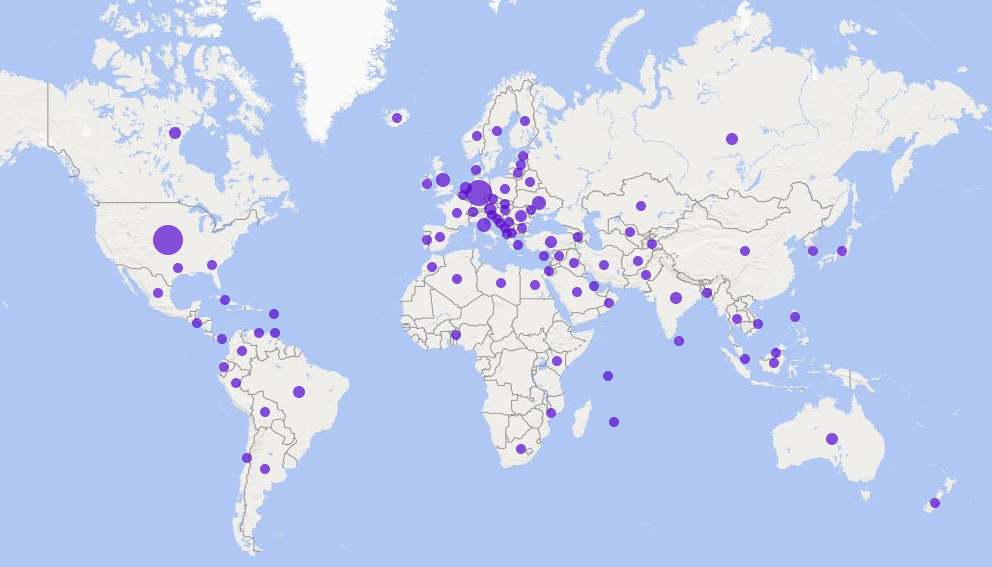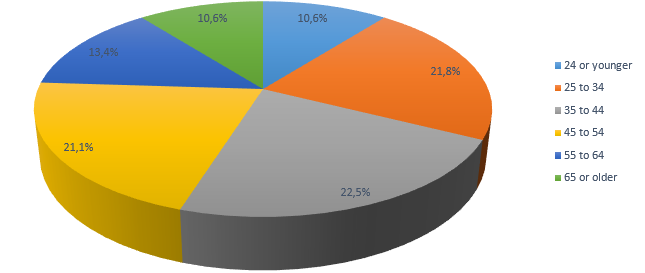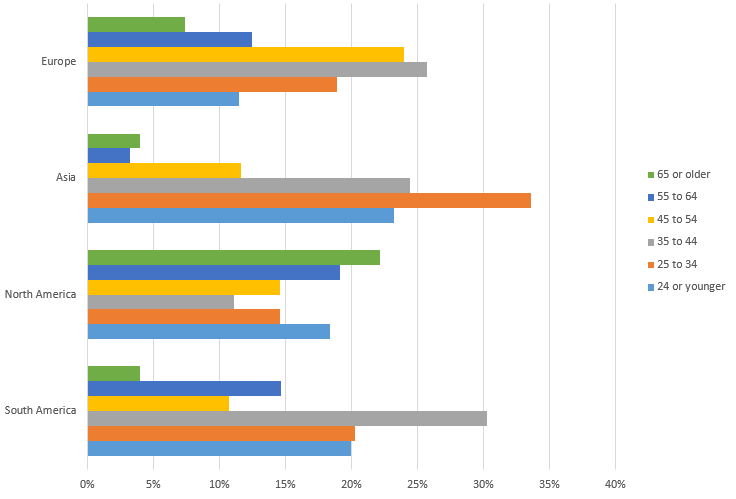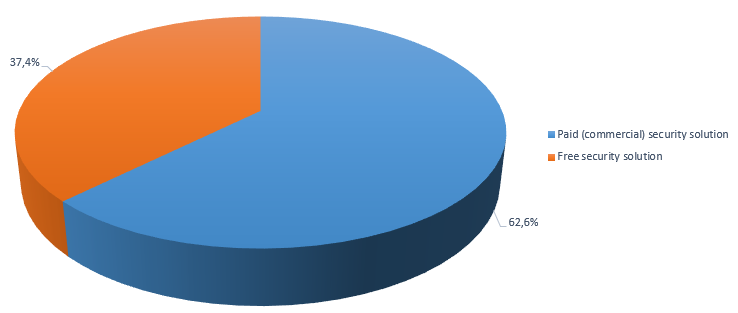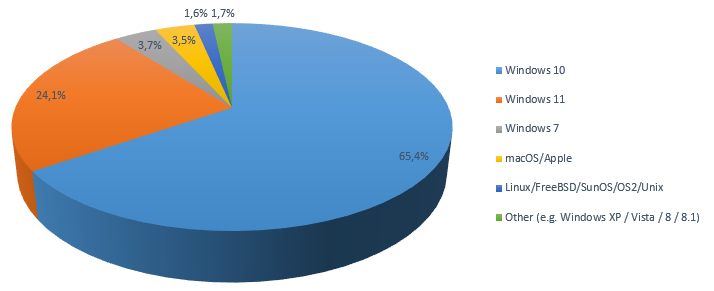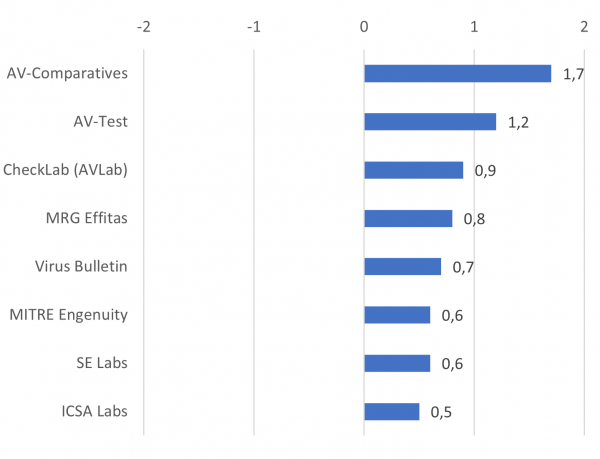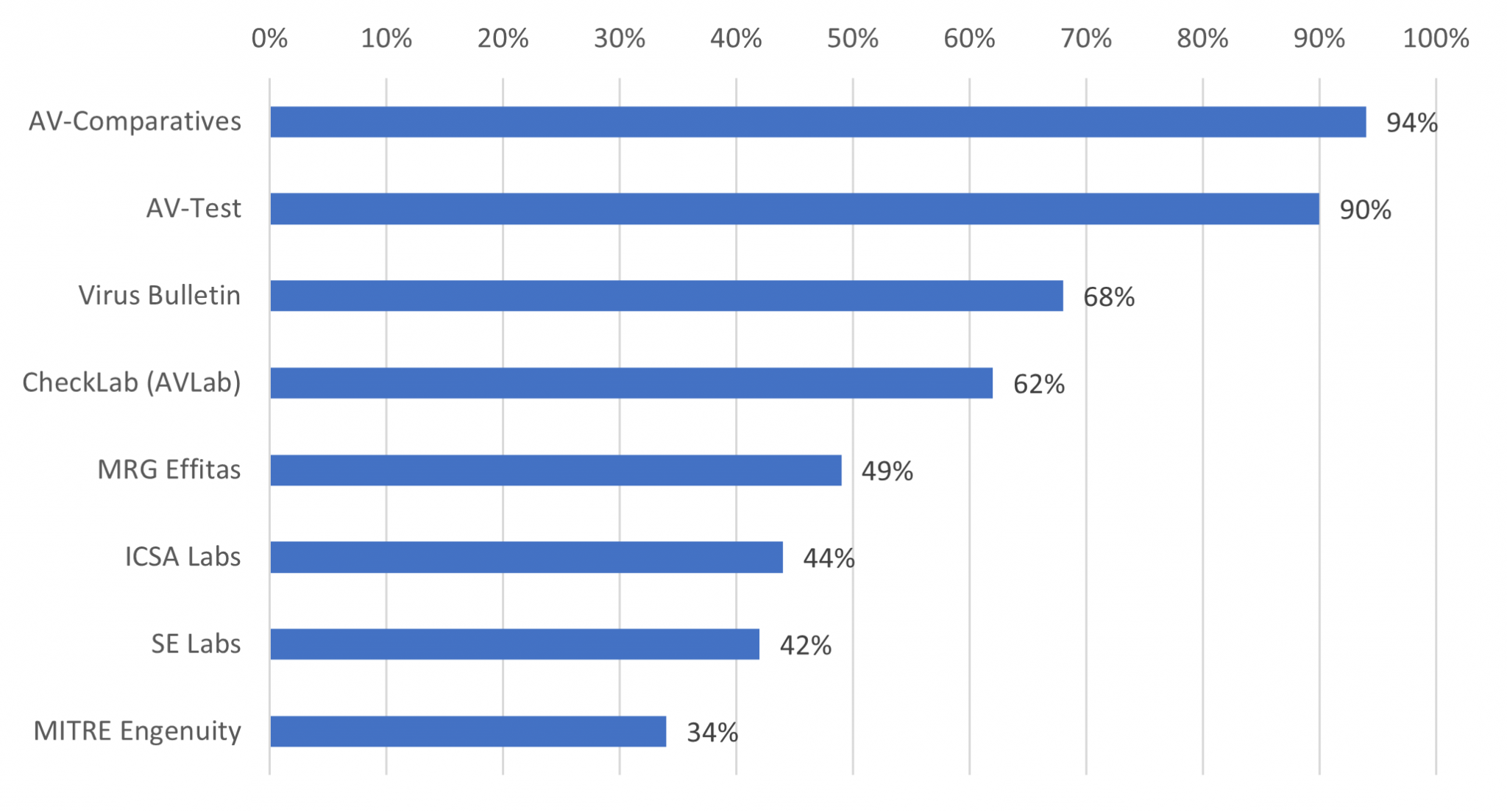We have conducted our annual survey, which helps us to improve our service to the end-user community. Respondents were asked for their opinions on various topics related to anti-virus software testing and anti-virus software in general. We would like to thank everyone who took the time to complete the survey. The PDF version can be downloaded here.
IT Security Survey 2022
Survey Period: 9th December 2021 – 23rd December 2021
Valid responses of real users: 2,483
The survey ran for about two weeks. It contained various control questions and checks, which helped us to identify and remove invalid responses.
The survey results are invaluable to us. This report contains the results of the survey questions.
Overview
As in 2020, measures to reduce the spread of COVID-19 caused very high Internet usage in 2021, compared to pre-Covid times. Working from home was the norm for millions of people, and face-to-face social gatherings were replaced by virtual meetings using platforms like Zoom and Skype. Whilst growth in laptop sales was not as high as in 2020, it still reached double figures. This makes security software for desktop operating systems more important than ever, as cybercriminals attempt to exploit the new situation.
This annual survey of computer users worldwide also focuses on which security products (free and paid), operating systems and browsers are most widely used.
Report results are based on the Internet survey run by AV-Comparatives between 9th December 2021 and 23rd December 2021. A total of 2,483 users from around the world answered questions on the subject of IT security.
Key Results
Please note that all the points made below refer only to our survey participants, not the general public.
- Windows 10 usage has fallen from over 80% last year to 65% this year. This is due to the uptake of Windows 11, which is already in use with 24% of survey respondents.
- With mobile operating systems, there has been a slight increase in iOS usage, which now accounts for almost a quarter of users. However, Android remains the most popular mobile OS by far, with all but three quarters of respondents using it.
- Usage of the Google Chrome browser has been very stable relative to last year, at about 35%. It is still the most popular browser. Mozilla Firefox remains the second most popular browser among survey participants, although its usage has declined from over a third last year to little over a quarter this year. Microsoft Edge accounts for much of the decline in Firefox usage, rising from about 15% last year to about 20% this year.
- Bitdefender is the most popular mobile security solution overall, with Kaspersky a close second. Bitdefender is the most popular program in both North America and South/Central America. Bitdefender, Kaspersky, ESET and Avast (in order of popularity) are found in the top four on every continent.
- Kaspersky, Microsoft, Bitdefender and ESET (in that order) are the four most popular desktop security products worldwide, and feature in the top five products on every continent.
- A majority of survey respondents were happy with their current security solution, with 85% stating that they were satisfied or very satisfied.
- Free security programs are more popular with younger respondents, whilst older users are more likely to pay for a security solution.
- Webcam protection was the single most popular additional feature in security products.
- Some security testing labs were much better known than others. AV-Comparatives was both the most recognised and the most trusted test lab amongst survey participants. We would like to thank respondents for their confidence in AV-Comparatives.
We are grateful to everyone who completed the survey. The feedback we have gained will be used to ensure that our tests continue to grow in effectiveness and relevance. This enables manufacturers to further improve their products, benefitting both themselves and their users. We are very pleased to see our test results being quoted by other publications in their reviews of AV and Internet Security products! All AV-Comparatives’ public test results are available to everyone free of charge at www.av-comparatives.org
Age distribution by continent is shown below. Asia had the youngest respondents, with about 57% being younger than 35. North America had the oldest respondents, with over 41% of them being older than 55 years. South America had about 51% in the 25 to 44 age groups, and Europe had about 50% aged between 35 and 54.
The most widely used operating system amongst respondents is Windows 10, accounting for over 65% of the total OS usage. Windows XP, Vista, 8, 8.1 are now defunct and hardly used anymore. Windows 7 usage has also dropped further to less than 4%. Nearly one quarter have already switched to Windows 11. This suggests that the survey’s audience might be very tech-oriented, as Windows 11 usage among the general public is only about 8%, according to statistics. Over 3% of respondents use macOS. In North America, Apple’s macOS is more commonly used than in the rest of the world, with about 8% market share. Our review/test of Mac security products is available at https://www.av-comparatives.org/consumer/testmethod/mac-security-reviews/
A list of Mac security products can be found here: https://www.av-comparatives.org/list-of-av-vendors-mac/
As shown in the diagram, Google Chrome is still the most popular browser amongst survey participants worldwide, with 35.4% of respondents using it. In second place is Mozilla Firefox (27.9%). Microsoft Edge is gaining market share rapidly and reached the third place with 18.8%, apparently at the expense of Mozilla Firefox. We would encourage AV vendors who use browser plug-ins for their URL-blocking features to make these work for as many browsers as possible, not just the most popular ones. Microsoft Internet Explorer can now be considered as defunct.
Android is the most popular mobile OS among our survey participants, accounting for over 74% of users worldwide. In North America, iOS is more popular than in other regions, accounting for about 43%. In Asia and South America, most users (over 84%) use Android. Our Mobile (Android) security review/test report is available at https://www.av-comparatives.org/consumer/testmethod/mobile-security-reviews/
An overview of security products for Android can be found here: https://www.av-comparatives.org/list-of-mobile-security-vendors-android/
37.6% of respondents overall do not use any security solution on their mobile phones.
Worldwide, the ten most commonly used manufacturers of mobile security products are, in decreasing order: Bitdefender, Kaspersky, ESET, Avast, Malwarebytes, McAfee, Sophos, Norton, Avira and Trend Micro.
The list below shows the 10 most popular mobile security manufacturers used by survey participants, according to continent. There were not enough responses from some regions to produce significant results. Therefore, Australia/Oceania and Africa are not shown.
| Europe | North America | Asia | South/Central America |
|
|
|
|
Avast, Bitdefender, ESET and Kaspersky were the most popular mobile security product in all 4 regions.
Major products for mobiles were reviewed by AV-Comparatives in a report in 2021. It is located at: https://www.av-comparatives.org/consumer/testmethod/mobile-security-reviews/
Worldwide, the twelve manufacturers of anti-malware products for Windows platforms most commonly used by survey participants are (in this order): Kaspersky, Microsoft, Bitdefender, ESET, Avast, Norton, Malwarebytes, Avira, McAfee, Panda, AVG and Trend Micro.
On all 4 continents with significant results, the same 4 vendors can be found in the top 5 places. These are (alphabetically): Bitdefender, ESET, Kaspersky and Microsoft.
Differences between continents
The table below shows the twelve products most commonly used by survey participants, by continent:
| Europe | North America | Asia | South/Central America |
|
|
|
|
Over 85% of the survey participants are satisfied or very satisfied with their current security solution.
Just over half of survey respondents do not use any of the additional features included in their security product. Amongst those who do, the four most popular additional features (over 20% of those users who make use of additional features) were webcam protection, antispam, VPN, and a secure browser. Webcam protection was the most popular individual feature; given that many people are working from home and conducting virtual meetings, this is perhaps not surprising.
System performance tuner, cryptomining, data shredder, backup, ransomware folder shield and data breach detector were the least used (less than 10% of those users who make use of additional features). Cryptomining clearly has nothing to do with security, and carries its own risks. It is questionable whether it should be included in a security product. Whilst data-breach detectors can be useful, many are available for free on the Internet, and in some cases, the feature in a security product may just connect to one of these services.
As a general rule, we would argue that having more additional features does not automatically mean that a product is better. Some added functionality, such as password managers and cloud backups, may serve to keep you tied to a particular security vendor, as it could be difficult to move your backed-up data or passwords to alternative services. Other features may be added for the vendor’s marketing purposes, rather than genuine needs of the user.
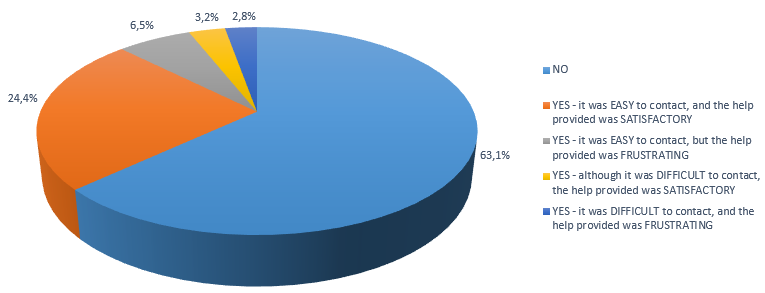
Almost two thirds of respondents have not tried to contact their AV vendor’s support services recently. Among users of paid-for products, almost one third have contacted their vendor’s support service and found it easy, and also got satisfactory assistance. Among users of free products, just over one tenth have contacted support, found it easy, and been satisfied with the help received. This might suggest that relative to free products, paid-for AV programs might provide more effective, easier-to-reach support when needed.
Below are the 15 most-requested consumer/home-user products:
- Kaspersky
- Bitdefender
- ESET
- Microsoft
- Avast
- Malwarebytes
- Avira
- Norton
- McAfee
- Trend Micro
- G Data
- Panda
- F-Secure
- Sophos
- AVG
Below are the 20 most-requested business/enterprise products:
- Kaspersky
- Bitdefender
- ESET
- Microsoft
- Avast
- Malwarebytes
- Sophos
- McAfee
- Trend Micro
- F-Secure
- Cisco
- Symantec (Broadcom)
- CrowdStrike
- FireEye
- G Data
- VMware CarbonBlack
- WatchGuard (Panda)
- Fortinet
- Check Point
- Acronis
Most of the popular vendors are usually included in at least some of our public tests and reviews, while most of the other vendors commission separate tests and/or participate privately in certain tests.
You can find our test and reviews here:
Consumer: https://www.av-comparatives.org/consumer/
Enterprise: https://www.av-comparatives.org/enterprise/
Users had to rate various security product testing labs and institutes by giving a score from -2 to +2, where +2 meant reliable/trustworthy and -2 unreliable/biased. Note that not all respondents were aware of all the labs, so each lab was only rated by those who were aware of it. For more information, please see the next page. Labs which were unknown to over 75% of all respondents are not listed.
Only AV-Comparatives and AV-Test reached a score higher than 1. We hope that our high rating is down to the carefully prepared methodology of our tests, meaningful number of samples, transparency, and freely available test reports, which describe the tests in detail. Our willingness to allow other publications to cite our results (subject to proper attribution) also increases our visibility.
For products that are not tested by us, we recommend our readers to look at the tests done by other well-known testing labs or at least certification bodies. For a list of some other testing labs, go to http://www.av-comparatives.org/list-of-av-testing-labs/
Which are the best-known AV testing labs?
We asked which testing labs were known to the survey participants. Obviously, anybody who has seen our website, newsletter or social media accounts will be aware of AV-Comparatives. Consequently, for AV-Comparatives we tried to remove the survey responses that came directly from our website, our newsletter and our social media accounts, in order to create a level playing field. Testers that were unknown by over 75% all survey participants have been removed from the results shown below.
Below you can see the percentages of participants that have heard of the respective labs:
AV-Comparatives and AV-Test are the best-known labs overall, and in each of the 4 regions.
The table below ranks the testing labs based on how well they are known on each continent:
| Europe | North America | Asia | South/Central America |
|
|
|
|
Please note that not all the testing labs have the same testing focus. That is to say, some may test only business products, others only consumer products; some may only provide certification (i.e. simply verify that products reach a certain minimum level, without providing comparative data); some may limit their tests to products from a particular country or region, or in a certain language
Prize raffle
This year, we ran a prize raffle, open to survey participants. 400 lucky winners won a licence for a security product, kindly provided by the respective vendors, Avast, AVG, Bitdefender, ESET, K7, Kaspersky, Malwarebytes and McAfee. Congratulations to the winners, and a big thank-you to everyone who took the time to complete the survey!
Copyright and Disclaimer
This publication is Copyright © 2022 by AV-Comparatives ®. Any use of the results, etc. in whole or in part, is ONLY permitted after the explicit written agreement of the management board of AV-Comparatives prior to any publication. AV-Comparatives and its testers cannot be held liable for any damage or loss, which might occur as result of, or in connection with, the use of the information provided in this paper. We take every possible care to ensure the correctness of the basic data, but a liability for the correctness of the test results cannot be taken by any representative of AV-Comparatives. We do not give any guarantee of the correctness, completeness, or suitability for a specific purpose of any of the information/content provided at any given time. No one else involved in creating, producing or delivering test results shall be liable for any indirect, special or consequential damage, or loss of profits, arising out of, or related to, the use or inability to use, the services provided by the website, test documents or any related data.
For more information about AV-Comparatives and the testing methodologies, please visit our website.
AV-Comparatives
(February 2022)







